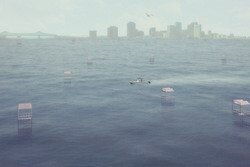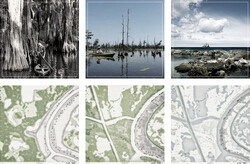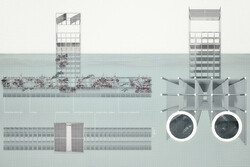
An intricate network of oil and gas pipelines weaves itself through the coastal region of Louisiana. More than 50,000 miles of pipelines cover the region, which is almost 5.6 times the perimeter of the United States.

Oil drilling and pipeline installation are primary reasons for land deterioration, loss, and subsequently the gradual salination of wetland and general destruction of ecology. In the last 200 years alone, since the discovery of oil in the area, the terrain in the coastal Louisiana region has been transformed drastically and unpredictably. Due to the failure of oil companies to secure and maintain the pipelines over time, and due to soil erosion, land loss, and water salination, the pipelines are becoming more and more exposed. The increased vulnerability of the pipelines increases the possibility of oil spills that are catastrophic on human, ecological, and environmental scales.

With the land, ecology, and human movement in a constant state of change, the pipeline infrastructure becomes a constant feature in a dynamic landscape. The project transforms the pipeline infrastructure into a coral reef.

The intervention uses the method of cathode accretion by putting a small electrical charge in the water that draws calcium carbonate (what reefs are made of) out of solution and onto the ferrous metal skeleton. The process requires salt water and will thus be strengthening and developing over time taking advantage of the gradual salination of the water. With time the accumulation of calcium becomes structural further protecting the pipeline and the development of a coral reef.

The calcium slowly accumulates, creating an artificial reef and accordingly a natural barrier that breaks up wave energy. The project takes the pipeline as a threat and inevitable catastrophe as an opportunity and transforms it into the first line of protection to the city of New Orleans.

- Location: Mississippi Delta, Louisiana
- Program: Coral Reef
- Year: 2018
- Category: Speculative
- Team: Dana Muhsen
© by fiveten 2023
